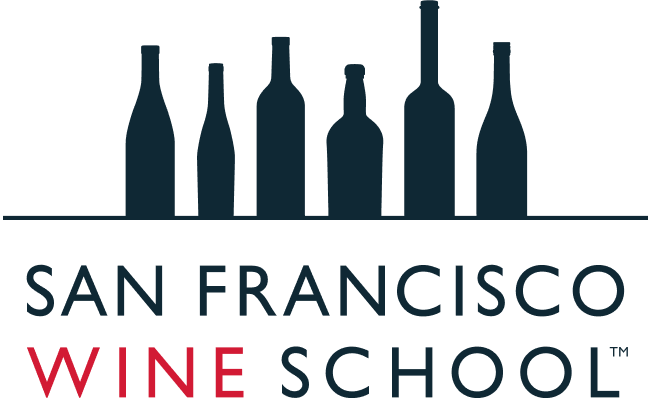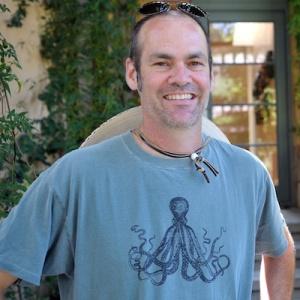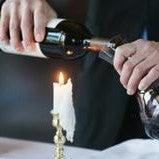Between officing at home and Quixote Winery where his own label, Pott Wines, are vinified, native Californian Aaron Pott looks to the interests of mostly Napa Valley clients who cherish his ability to nurture some of the best out of their mostly Cabernet Sauvignon vines & wines. Upon graduating from UC-Davis and stints at Opus One, Newton, and Kongsgaard, he went to Bordeaux to work at Château Troplong-Mondot, later becoming head winemaker at Château La Tour Figeac, returned to the US to head international winemaking for Beringer Wine Estates and later accepted the position of GM/winemaker at Quintessa. The time at Quintessa seems to have spurred him to his current course of consulting to properties located near his central Napa Valley stomping grounds. In addition, he has a small Gewürztraminer project in concert with neighbors Stephen Lagier & Carole Meredith. The following interview occurred at the Quixote crush pad.
What are the particularities involved in wine grape growing as a consultant?
It takes a lot of time learning new areas such as Italy, Chile, and Argentina where I'd worked in the past. You can't just drop into a place and tell people who know their land and climate what to do; in places already growing wine grapes they know what to do. I'm happy now to only drive around where I live in Napa Valley; my world is here and I really want to focus on this. I'm at the stage of my life where I want to look closely at this place while working here. There are people here and elsewhere capable of doing things at the far reaches of the world, but you need people on the ground to synthesize that information to make it work. Michel Rolland has great technique and is a great taster and really knows what's going on, yet most flying winemakers have clients only interested in having a name such as his attached to their property; this is unfortunate. The financial aspect could be beneficial but it's not the life I want to lead.
We've passed a little time enjoying and expounding upon the virtues of beer and booze. What led you to choose the grape over these other wet pleasures--why wine and not beer or booze?
I don't drink distilled spirits, never been interested in them. I like Scotland for tramping around--it's pretty but the taste of whiskey is too intense for me, and the bitterness of beer is too aggressive for me. Those beverages can have complexity but they're not even close to expressing themselves like wine, where one site aside to another can produce totally different things.
Early in your career, which winemakers and wines inspired you?
My introduction to wine came working for John Kongsgaard at Newton in 1990; he was an important mentor to me. During that same period I met Michel Rolland. The idea of ripeness in grapes, how to control yields and to control grapes to get quality wines were valuable lessons I got from Michel. Before that, while a UC-Davis undergrad working as a lab tech at Opus One, the idea was to taste everything that came through the tasting room. At the time it was looking at a lot of top French wines, wines that were above my pay grade. My most memorable wines are '71 Assmannshausen Spätburgunder Staatsweingüter, '59 DRC Romanée-Conti, '47 Petrus.
While you're likely past being inspired, which winemakers today intrigue you, catch the corner of your eye?
I like the old guys such as André Porchoret. Anyway, in my world too much attention is paid to the winemaker and not enough to the vineyard. Eric Hagyard (his assistant) is yet to be discovered.
What do you look for in assessing a potential vineyard's ability to produce quality grapes?
Everything under the sun--soil, exposure, slope & aspect, soil analysis via pH and minerals and nutrients, adapted cépages--how the variety or varieties are chosen for the site, rootstocks, clones, water use--how the soils use and retains it...and there's always climate.
You've worked extensively in Bordeaux and have established yourself in Napa Valley with a decided focus upon Cabernet Sauvignon. What are some of the similarities and differences in working with this grape in both areas that may not be revealed upon first glance?
Ripeness. When I worked in Bordeaux, in an okay year, you were sometimes forced to pick Cabernet with 9% potential alcohol, adding bags of sugar in the winery in order to get 'ripe'. In Napa Valley that's not the case. In most vintages we can make ripe Cabernet. My love of Bordeaux is more Right Bank than Left Bank with Rights being juicier, more appealing, aromatically interesting, more to say about where they're from than Left Bank wines are. The Mèdoc for the most part was created by Dutch drainage engineers while coincidentally a new variety had appeared that was wonderful and useable for the climate--Cabernet Sauvignon.
Keith Richards as Merlot holding it together with its rhythm, Mick Taylor or Ron Wood leading as Cabernet Sauvignon?
Merlot's more a bass guitar. It does wonderful things to the mid-palate; it's very aromatic and is a good finisher. It gives wines good density and texture. Cabernet Sauvignon is the muscle giving it power and intensity.
What's the extent of your involvement with Danica Patrick's wine project?
We're consulting on it. The vineyard just started to produce a tiny amount of wine from Cabernet Sauvignon and Petit Verdot last year, and it looks very good. Beyond that it's unknown. It's a beautiful property, a super-rocky site very challenging to develop located next to Viader.
If you hadn't chosen Napa Valley, where would you have chosen to live?
I would've chosen England. I think Kent is interesting--the climate, the balance of the wines, it's a place where there's a lot of work to be done, I think it has a great future.
Why 'from the sky to the center' as Pott Wines' motto as shown on your website?
We'd found a banner on our label and decided to put a pretentious Latin saying on it to appeal to a refined consumer. We also considered a translation from Monty Python's Finnish-English dictionary skit "my hovercraft is full of eels." 13 billion light years from Earth, post-Big Bang, one of the earliest SuperNovas exploded. I imagined a photon of light traveling the vastness of space and arriving on a leaf, then being turned into wine. That's what led us to use the phrase. I puts out our love of grapes and vineyards rather than wine. We're interested in the vineyard and not just the wine aspect of it. That's the first step in making great wine--focusing on the vineyard.
Do you have any advice for a sommelier considering venturing into winemaking as a sideline activity?
Don't try to create something that you like, try to create something the site will create and get the best from it. A lot of people go into winemaking, and end up shoehorning what they think the site ought to give them rather than what it naturally gives.
Your opinion of MSs?
I wish we had more. People who are interested and passionate about wine is what we're all about. That's our target audience. I like it when people 'get' all the work we do.
Discover Napa's impact on the state of California and its significance within the world of wine through our Napa Valley workshop.
Check out our full schedule of programs, workshops and public events. Private, customized experiences and corporate training is also available.


